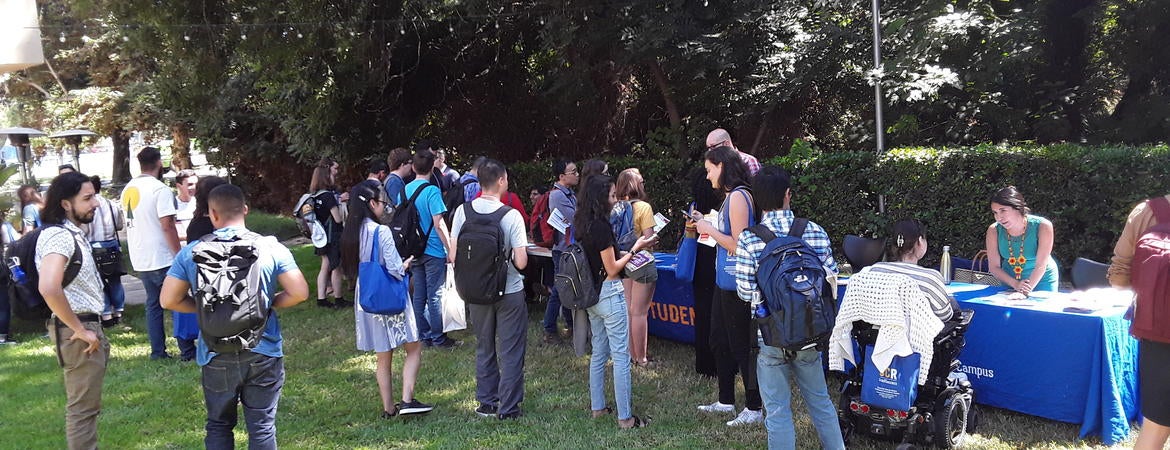Supporting Graduate Students' Academic and Professional Success

Whether you just got to graduate school or you've been here for years, you probably wouldn't be where you are today without the mentorship of others. One of the great things about mentorship is that anyone and everyone can benefit from engaging in the act of mentoring, as long as the needs of the mentee and the skills of the mentor are a match. How can mentorship benefit you, you ask?
[Image Description: Baby Sinclair, from the TV show Dinosaurs, narrows his eyes at someone off-screen and asks, "What's in it for me?"]
The benefits of mentorship are plentiful! Not only can a mentor help you in a variety of ways, but they can also help you across a variety of domains. When we think ‘mentor’, we may immediately think of academia and our labs. Of course, your graduate advisor, other faculty in your department, and your fellow graduate students are a rich source of guidance - these individuals can assist you in meeting your academic and research goals. They can work through ideas with you, they can guide you through the program and projects, they can inform you of funding and research opportunities, and they can encourage you to set realistic goals. In graduate school, it is easy to want to 'go big' with your research and the environment often encourages it. Nonetheless, it is important to be realistic given the space and time you have available. Having people in your life to help you set goals and provide guidance on how to reach those goals is a crucial way mentorship can benefit you. Given that you're in graduate school currently, research is probably a big component of your life. With that in mind, this form of mentorship is invaluable. But we are more than our research, right?
[Image Description: A half-circle scale drawn in a style similar to chalk drawings. On one end of the scale is the word NO and on the other hand of the scale is the word YES. As we watch, the arrow shifts to rest on the word YES.]
Yes, we are more than our research. Of course, our research is a large part of who we are, but it is also important to remember to appreciate the other components of our lives. Thankfully, mentorship can also help you keep a balance in this as well. Whether it is your advisor, a friend outside of the university, a mentor gained through the department or through a university program, it's nice to be reminded of work-life balance. It may even be necessary at times! Graduate students can easily get lost in the stressors of graduate school, so having a mentor who can remind you of your successes, provide you with someone to hear you out, and endorse self-care can be as equally invaluable as someone who encourages you to work hard in your studies.
[Image Description: A small bathtub surrounded by candles and bath salts sits against a pink background. A tiny tabby kitten climbs into the tub. Written in white text across the top of the image are the words: Me time.]
What does your self-care look like? Maybe it’s going for a hike, hanging out with friends, or taking a nice bubble bath. Whatever your go-to relaxation activity is, just remember to treat yourself every once in a while!
How do you find a mentor? Get involved! Get to know the faculty within your department, take classes in other departments, and collaborate with your peers and fellow researchers in your field. Attend departmental and university events - really allow yourself to become part of the UCR community. You never know who else might be attending these events. If you start to see the same people across different events, it might indicate a shared interest leading to a beneficial mentoring relationship.
[Image Description: Michael Scott, from The Office, rushes forward to throw his arms around Jim Halpert, knocking them both to the ground in his enthusiasm. Written in white text across the image are the words: When you finally find the perfect mentor.]
Another approach to finding a mentor is to apply to programs that are specifically structured around mentorship. UCR has programs such as the Graduate Student Mentoring Program, CONNECT Mentorship Program, and ChicanoLink Peer Mentor Program, which are all geared towards assisting graduate students in the transition to graduate school. Even as a mentor, the mentee-mentor relationship can be mutually beneficial – learning about resources together and from each other’s experiences is a valuable activity for all involved. You may be surprised where you find your mentors or the ways in which someone can mentor you. Maybe you find them while engaging in your hobbies and they teach you a new skill or maybe you find them through volunteering and they help you descover something you’re passionate about.
[Image Description: Close up of Tahani Al-Jamil, from The Good Place, tipping her head forward to say decisively, "Let's chat, shall we?"]
A final tip for mentorship – cast a wide net to meet all your needs. There are many aspects of our lives that can benefit from mentorship and one single mentor likely will not cover each of those varied needs you have. You may feel that finding a mentor is an intimidating process, but keep in mind the advice shared above to stay energized and open to these new relationship-building opportunities coming your way. If anything, you just might make a friend as well as a mentor!
[Image Description: Leslie Knope, from Parks and Recreation, smiles as she passionately begins to say, "But Webster's Dictionary defines 'friend'--"]
![Leslie Knope [Image Description: Leslie Knope, from Parks and Recreation, smiles as she passionately begins to say, "But Webster's Dictionary defines 'friend'--"]](/sites/default/files/styles/scale_367/public/giphy%20%283%29.gif?itok=WcctROCs)